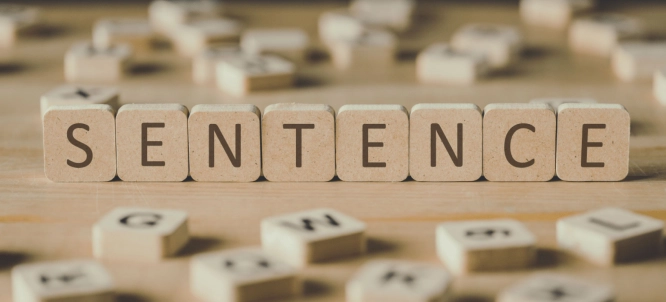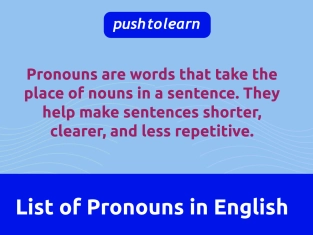by PushtoLearn
Parts of Speech
Table of Contents
- Parts of Speech Exercises
- 📌 The 8 Parts of Speech
- 1️⃣ Nouns – People, Places, Things, and Ideas
- 2️⃣ Pronouns – Replacing Nouns
- 3️⃣ Verbs – Actions and States
- 4️⃣ Adjectives – Describing Nouns
- 5️⃣ Adverbs – Describing Verbs, Adjectives, and Other Adverbs
- 6️⃣ Prepositions – Showing Relationships
- 7️⃣ Conjunctions – Connecting Words and Ideas
- 8️⃣ Interjections – Expressing Emotions
- FAQ
Parts of Speech Exercises
These exercises focus on Parts of Speech.
📌 The 8 Parts of Speech
|
Part of Speech |
Function |
Examples |
|
Noun |
Names a person, place, thing, or idea. |
dog, London, happiness, book |
|
Pronoun |
Replaces a noun. |
he, she, it, they, you, we |
|
Verb |
Shows an action or state. |
run, eat, is, have, jump |
|
Adjective |
Describes a noun. |
happy, big, blue, fast |
|
Adverb |
Describes a verb, adjective, or another adverb. |
quickly, very, well, slowly |
|
Preposition |
Shows the relationship between words. |
in, on, at, under, with |
|
Conjunction |
Connects words, phrases, or clauses. |
and, but, because, or |
|
Interjection |
Expresses strong emotion. |
wow, oh, ouch, hey |
📌 Tip: Some words can belong to more than one part of speech depending on how they are used.
✔️ Example:
-
I love fast cars. (adjective)
-
He drives fast. (adverb)

1️⃣ Nouns – People, Places, Things, and Ideas
🔹 Types of Nouns:
✔️ Common Nouns – book, city, car
✔️ Proper Nouns – Harry Potter, London, Toyota
✔️ Abstract Nouns – love, happiness, freedom
✔️ Countable Nouns – apple, chair, idea
✔️ Uncountable Nouns – water, air, information
✔️ Examples:
-
This book is interesting. (Thing)
-
Paris is a beautiful city. (Place)
-
Love is important. (Idea)
📌 Common Mistake:
❌ I have many informations.
✅ I have a lot of information.
2️⃣ Pronouns – Replacing Nouns
✔️ Types of Pronouns:
-
Subject Pronouns → I, you, he, she, it, we, they
-
Object Pronouns → me, you, him, her, it, us, them
-
Possessive Pronouns → mine, yours, his, hers, ours, theirs
-
Reflexive Pronouns → myself, yourself, himself, herself, itself, ourselves, themselves
✔️ Examples:
-
She is my best friend. (Subject Pronoun)
-
This book is mine. (Possessive Pronoun)
📌 Common Mistake:
❌ Me and Sarah went to the park.
✅ Sarah and I went to the park.
3️⃣ Verbs – Actions and States
✔️ Types of Verbs:
-
Action Verbs → run, dance, eat
-
State Verbs → be, know, believe
-
Helping Verbs (Auxiliary Verbs) → am, is, are, have, do, will
-
Modal Verbs → can, should, must
✔️ Examples:
-
She runs every morning. (Action)
-
He is very kind. (State)
📌 Common Mistake:
❌ He can to swim.
✅ He can swim.
4️⃣ Adjectives – Describing Nouns
✔️ Examples:
-
The sky is blue.
-
She has a beautiful dress.
✔️ Adjective Order:
(Opinion → Size → Age → Shape → Color → Origin → Material → Purpose)
✅ A beautiful small old round red Italian wooden coffee table.
📌 Common Mistake:
❌ She has a red big car.
✅ She has a big red car.
5️⃣ Adverbs – Describing Verbs, Adjectives, and Other Adverbs
✔️ Types of Adverbs:
-
Manner (How?) → quickly, slowly, badly
-
Place (Where?) → here, there, everywhere
-
Time (When?) → now, soon, yesterday
-
Degree (To what extent?) → very, too, enough
✔️ Examples:
-
She speaks English fluently.
-
He drives too fast.
📌 Common Mistake:
❌ He speaks good English.
✅ He speaks English well.
6️⃣ Prepositions – Showing Relationships
✔️ Examples:
-
The book is on the table. (Place)
-
We met after school. (Time)
✔️ Common Prepositions:
-
Time → at, on, in
-
Place → in, on, under, beside
-
Direction → to, into, onto
📌 Common Mistake:
❌ I was born in Monday.
✅ I was born on Monday.
7️⃣ Conjunctions – Connecting Words and Ideas
✔️ Types of Conjunctions:
-
Coordinating (FANBOYS: For, And, Nor, But, Or, Yet, So)
-
Subordinating (because, although, while, if)
-
Correlative (either…or, neither…nor, both…and)
✔️ Examples:
-
I like tea and coffee.
-
She is tired, but she keeps working.
📌 Common Mistake:
❌ He is very tired, so he went to sleep.
✅ He is very tired so he went to sleep.
8️⃣ Interjections – Expressing Emotions
✔️ Examples:
-
Wow! That’s amazing!
-
Ouch! That hurts!
📌 Common Mistake:
❌ Oh no, I forgot my keys.
✅ Oh no! I forgot my keys.
FAQ
Can a word belong to more than one part of speech?
➡️ Yes.
✔️ Example:
-
Run (Verb): I run fast.
-
Run (Noun): I had a good run.
What is the most important part of speech?
➡️ Verbs—every sentence needs a verb.
What’s the difference between an adjective and an adverb?
➡️ An adjective describes a noun → She is happy.
➡️ An adverb describes a verb → She sings happily.

